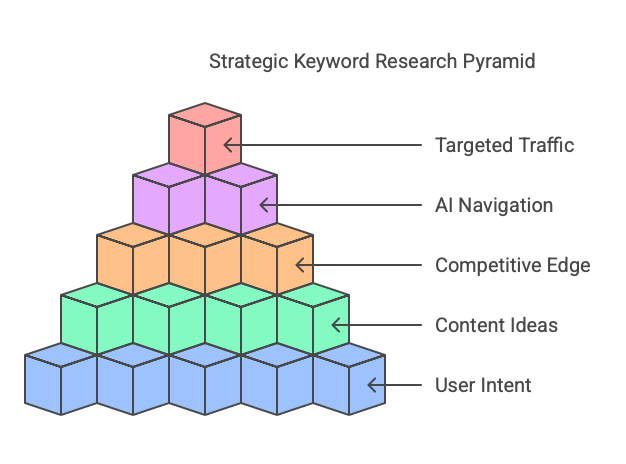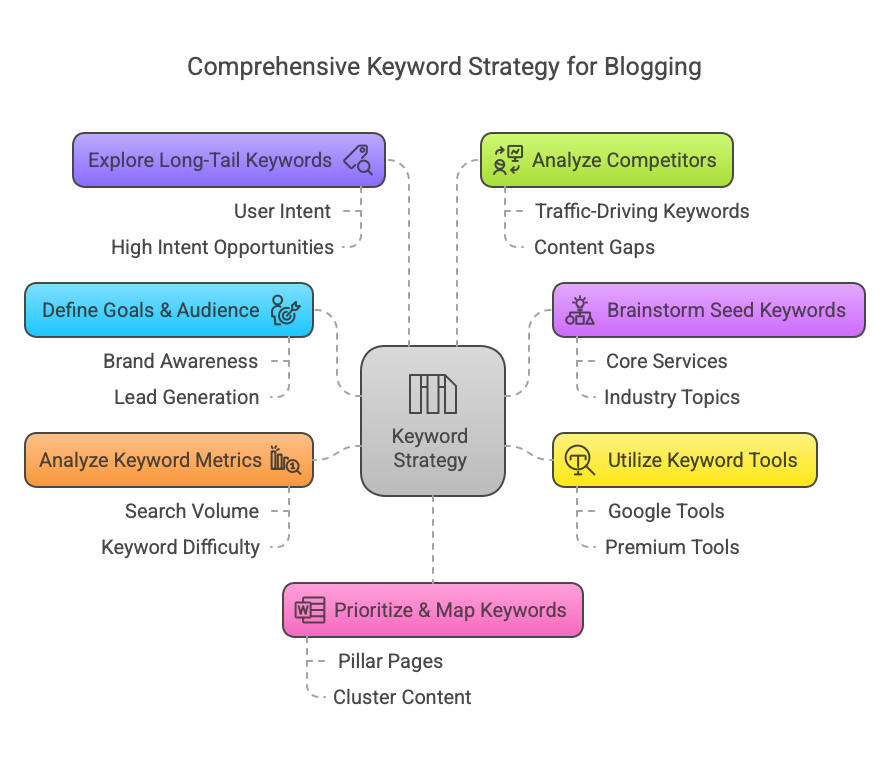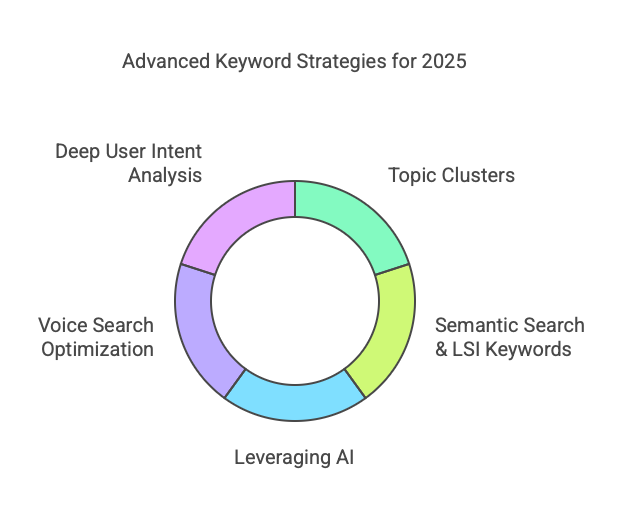
The digital landscape is more crowded than ever. For bloggers aiming to cut through the noise in 2025, simply creating content isn’t enough. You need strategic content – content that answers the right questions, meets user needs, and gets discovered by search engines. The cornerstone of this strategy? Keyword research.
Many bloggers, from seasoned pros managing multiple niche sites to small businesses venturing into content marketing, know keyword research is important. Yet, the process can feel overwhelming, constantly evolving with search engine algorithms and the rise of AI.
This guide is here to demystify keyword research for 2025. We’ll break down the essential steps, explore advanced techniques, and show you how to integrate this crucial practice into your workflow, ensuring your blog attracts the right audience and achieves your goals.
What is Keyword Research (and Why It’s Still Crucial in 2025)?
At its core, keyword research is the process of understanding the language your target audience uses when searching for information, products, or services online. It involves identifying the terms (keywords) they type into search engines like Google and analyzing various metrics associated with those terms.

Why is it more critical than ever in 2025?
- Understanding User Intent: Modern SEO is less about stuffing keywords and more about understanding why someone is searching. Keyword research helps you decipher user intent (are they looking to learn, compare, or buy?) so you can create content that truly satisfies their needs.
- Content Idea Generation: Stuck on what to write about? Keyword research uncovers the topics and questions your audience is actively asking, providing a goldmine of relevant content ideas.
- Competitive Edge: Understanding the keywords your competitors rank for (and where they fall short) allows you to identify opportunities and carve out your niche.
- Navigating AI & Semantic Search: Search engines are increasingly sophisticated, understanding context and synonyms (semantic search). While exact match keywords are less rigid, foundational keyword research helps you understand the core topics and related concepts search engines (and users!) associate with your niche.
- Driving Targeted Traffic: Targeting the right keywords attracts visitors genuinely interested in your content or offerings, leading to higher engagement and better conversion rates (leads, sales, sign-ups).
Understanding Keyword Types
Not all keywords are created equal. Understanding the different types helps you target your audience more effectively:
- By Length:
- Head Terms: Short (1-2 words), high search volume, high competition (e.g., “blogging,” “SEO”).
- Body Keywords: Medium length (2-3 words), good volume, slightly less competition (e.g., “keyword research tools,” “blog content strategy”).
- Long-Tail Keywords: Longer phrases (4+ words), lower volume, much lower competition, often highly specific intent (e.g., “best keyword research tools for beginners 2025,” “how to create a blog content calendar”). Long-tails are often where bloggers find the best opportunities.
- By Intent:
- Informational: Seeking information (e.g., “how does keyword research work,” “what is SEO”).
- Navigational: Looking for a specific website (e.g., “BlogCopilot login,” “Google Analytics”).
- Commercial: Investigating products/services before purchase (e.g., “best WordPress SEO plugins,” “BlogCopilot vs competitor”).
- Transactional: Ready to buy or take action (e.g., “buy BlogCopilot plugin,” “download free SEO checklist”).
The Keyword Research Process: A Step-by-Step Guide for 2025

Let’s break down the process into actionable steps:
- Define Your Goals & Understand Your AudienceBefore you even think about keywords, ask:
- What are the goals of my blog? (Brand awareness, lead generation, affiliate sales, etc.)
- Who is my ideal reader? (Demographics, pain points, interests, online behavior)
- What problems does my content solve for them?
This foundation guides your entire keyword strategy.
- Brainstorm Seed KeywordsStart with broad topics relevant to your niche. Think like your audience. What basic terms would they use?
- Your core services/products (e.g., “content organization,” “blog writing”)
- The problems you solve (e.g., “writer’s block,” “low blog traffic”)
- Your industry (e.g., “WordPress plugins,” “digital marketing”)
- Utilize Keyword Research ToolsSeed keywords are just the beginning. Tools are essential for expanding your list and gathering data. Options range from free to premium:
- Google Keyword Planner: Free (requires Google account), good starting point for volume estimates and ideas.
- Google Search & Related Features: Look at “People Also Ask,” “Related Searches,” and Google Autocomplete for real user queries.
- Google Trends: Analyze the popularity of topics over time and by region.
- Premium Tools (Semrush, Ahrefs, Moz, etc.): Offer in-depth data on volume, difficulty, competitor analysis, related keywords, questions, and more. Essential for SEO professionals and serious bloggers.
- Specialized Tools (e.g., Ubersuggest, AnswerThePublic): Focus on question-based keywords and content ideas.
- Analyze Keyword MetricsDon’t just collect keywords; analyze them:
 Search Volume: How many people search for this term per month? (Higher isn’t always better if competition is fierce).
Search Volume: How many people search for this term per month? (Higher isn’t always better if competition is fierce).- Keyword Difficulty (KD): How hard is it to rank for this keyword? (Tools provide scores based on factors like backlinks and domain authority of ranking pages). Aim for a balance relevant to your site’s authority.
- Search Intent: What is the user really looking for? Does your content match? (Analyze the current top-ranking pages).
- Relevance: How closely does the keyword align with your content, products, or services?
- Click-Through Rate (CTR) Potential: Are the search results dominated by ads, featured snippets, or video carousels that might reduce clicks to organic results?
- Dig for Long-Tail Keywords & QuestionsThis is where you find less competitive opportunities. Use your tools and Google’s features (“People Also Ask”) to identify specific phrases and questions your audience is searching for. These often indicate high intent and are perfect for targeted blog posts.
- Analyze Your CompetitorsIdentify blogs and websites ranking for your target keywords. Use premium tools to see:
- Which keywords drive their traffic?
- What are their top-performing pages?
- Where are their content gaps (keywords they aren’t targeting effectively)?
- What is their backlink profile like?
Learn from their successes and find opportunities they’ve missed.
- Prioritize & Map Keywords to ContentYou’ll likely have a large list. Now, prioritize based on relevance, volume, difficulty, and your goals. Group related keywords into topic clusters and map them to specific pieces of content:
- Pillar Page: A comprehensive guide covering a broad topic (targets head/body keywords).
- Cluster Content: Specific blog posts covering subtopics or long-tail keywords related to the pillar page, linking back to it.
Advanced Keyword Research Techniques for 2025

For SEO pros and advanced bloggers looking to level up:
- Topic Clusters: Organize content around core topics rather than isolated keywords. This signals expertise to search engines and improves site structure.
- Semantic Search & LSI Keywords: Think beyond exact matches. Identify related concepts, synonyms, and subtopics (Latent Semantic Indexing – LSI keywords) to create comprehensive content that fully covers a subject.
- Leveraging AI: Use AI tools (cautiously) for brainstorming keyword variations, analyzing user sentiment, identifying emerging trends, or even generating initial content outlines based on keyword groups.
- Voice Search Optimization: Consider how people ask questions verbally (often longer, more conversational phrases).
- Deep User Intent Analysis: Go beyond the basic intent types. Is the user in the awareness, consideration, or decision stage? Tailor content precisely to their journey.
Integrating Keyword Research into Your Workflow
Keyword research isn’t a one-off task. Integrate it continuously:
- On-Page SEO: Naturally incorporate primary and related keywords into your title tags, meta descriptions, headings (H1, H2s), body text, image alt text, and URLs. Avoid keyword stuffing!
- Content Briefs: Create detailed briefs for writers that include target keywords, user intent, related questions, desired length, and internal linking opportunities.
- Content Calendar Planning: Use keyword research to plan your editorial calendar, ensuring a steady stream of relevant, search-optimized content.
- Content Audits & Updates: Regularly review existing content. Can it be updated with new keyword insights or optimized to target different intent?
Measuring Success & Refining Your Strategy
How do you know if your keyword research is paying off? Track key metrics:
- Keyword Rankings: Use rank tracking tools to monitor your position for target keywords.
- Organic Traffic: Analyze Google Analytics to see how much traffic your target pages are receiving from search.
- Engagement Metrics: Look at bounce rate, time on page, and pages per session.
- Conversions: Are visitors taking the desired action (signing up for a newsletter, contacting you, downloading a resource)?
Use this data to refine your keyword strategy, double down on what works, and adjust your approach for underperforming content.
How BlogCopilot Can Help Streamline Your Efforts
While thorough keyword research requires strategic thinking and analysis, tools can significantly streamline parts of the process, especially when it comes to content creation and organization.
BlogCopilot is designed to support bloggers in implementing their keyword strategies more efficiently. By helping you organize content ideas derived from your research, facilitating bulk content creation or rewriting based on keyword targets, and potentially assisting with basic SEO tracking (depending on feature set), BlogCopilot acts as your partner in turning keyword insights into published, optimized content faster. It’s particularly valuable for SEO professionals managing multiple sites or SMEs needing to streamline their content workflow.
Conclusion: Make Keywords Work For You in 2025
Keyword research remains a fundamental pillar of successful blogging and SEO in 2025. By understanding your audience, leveraging the right tools, analyzing data intelligently, and integrating insights into your content workflow, you can create a blog that not only ranks well but also resonates deeply with your readers. It’s not just about finding terms; it’s about understanding needs and providing value.
Ready to transform your keyword insights into compelling blog content more efficiently? Explore how BlogCopilot can become your essential content creation and organization partner. Try our free tier today and see the difference!
